In the intricate world of sports, where passion and competition collide, the concept of justice serves as the ultimate arbiter. Yet, what happens when the very foundations of this justice system—its checks and balances—are called into question? In Italy, a recent spotlight has been cast on the structural integrity of its sports justice, igniting a crucial debate about independence, impartiality, and the very definition of fair play.
A System Under Scrutiny
The core of any robust judicial system lies in its independence. Judges should be free from external pressures, ensuring their decisions are based solely on merit and law, not on influence or conflicting interests. This principle, seemingly self-evident, becomes remarkably complex when applied to the unique ecosystem of sports. In Italy, the discussion has escalated from quiet concerns to public inquiry, spearheaded by influential figures who believe the current system may inadvertently undermine its own mission.
The Architects of Oversight: A Paradox?
At the heart of the concern lies a structural peculiarity: the appointment mechanism of sports justice bodies. As noted by attorney Gabriele Pezzano, a prominent voice in this debate, these critical bodies are often nominated by the very federal councils they might later be tasked with scrutinizing. Imagine, for a moment, a scenario where the referees for a match were chosen by one of the competing teams; the perception of impartiality, regardless of actual intent, would immediately be compromised. Pezzano articulated this concern, highlighting that this inherent link creates a delicate tightrope walk, where «checks and balances» might occasionally lose their footing.
The Italian National Olympic Committee (CONI) acts as the overarching supervisor, a crucial layer designed to ensure integrity. However, even CONI`s oversight, while vital, may not fully resolve the underlying structural issues. As Pezzano observes, the system`s «weights and counterweights» haven`t always functioned as optimally as one might hope. This isn`t necessarily an accusation of malfeasance but rather a technical observation about a system designed with the best intentions, yet potentially susceptible to logical conflicts.
From the Field to the Forum: Mauro Berruto`s Initiative
The call for a deeper look is not confined to legal circles. Mauro Berruto, the former coach of Italy`s national volleyball team and now a public official, has taken a significant step by formally requesting a cognitive inquiry into sports justice. Berruto`s initiative underscores the sentiment that these are not mere academic musings but practical concerns with real-world implications for athletes, federations, and the integrity of entire sports. His action transforms a legal discussion into a broader public discourse, pushing for transparency and accountability.
Why Does It Matter? The Fabric of Trust
One might wonder why such technicalities in judicial appointment processes are of widespread concern. The answer is simple: trust. Without an unshakeable belief in the fairness and independence of sports justice, every decision, every penalty, every victory or defeat risks being viewed through a lens of skepticism. This erosion of trust can permeate all levels of sport, from grassroots competitions to elite professional leagues. When the system tasked with upholding integrity is perceived to have inherent vulnerabilities, the very spirit of fair competition is at stake.
It`s an intriguing paradox: a system built on the principle of self-governance by sports federations inadvertently creates a potential for self-investigation, a concept that would raise eyebrows in almost any other judicial context. The irony, perhaps, is that the very autonomy sports bodies champion could become a double-edged sword, inadvertently hindering the full bloom of impartial justice.
The Path Forward: Re-engineering for Integrity
The current debate in Italy is not merely about finding fault but about seeking improvement. It’s an opportunity to critically assess and re-engineer a system to strengthen its resilience against perceived conflicts of interest. The goal is to ensure that when a decision is made, it stands unequivocally on the pillars of fairness and independence, untainted by even the slightest shadow of institutional entanglement.
Ultimately, the discussion initiated by figures like Pezzano and Berruto serves as a timely reminder that even in the high-stakes arena of professional sports, the integrity of the judicial process is paramount. For the love of the game, and for the trust of its participants and fans, the scales of justice must not only be balanced but also demonstrably independent, allowing sport to remain a true testament to skill, effort, and honorable competition.

